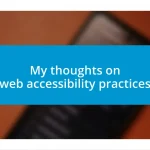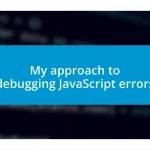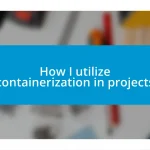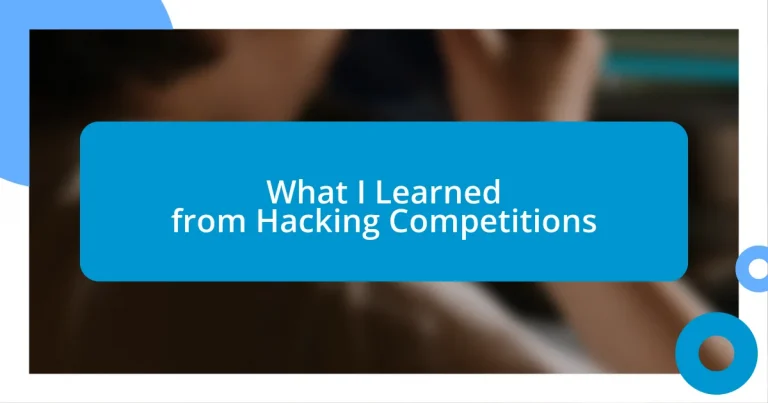Key takeaways:
- Hacking competitions enhance technical proficiency, teamwork, and adaptability, providing valuable skills applicable in real-world cybersecurity scenarios.
- Collaboration and effective communication within teams lead to innovative solutions, with the diversity of skill sets enriching problem-solving processes.
- Reflecting on failures and continuously engaging in self-study and community building fosters personal growth and deepens understanding of hacking principles.
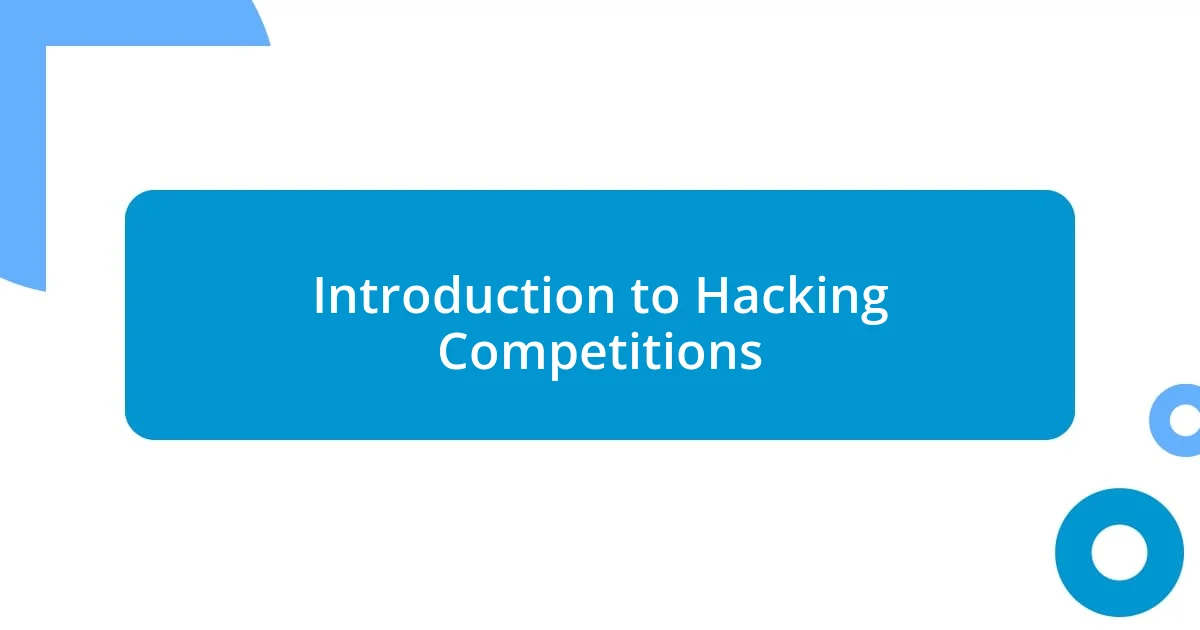
Introduction to Hacking Competitions
Hacking competitions, often called “capture the flag” (CTF) events, offer an exhilarating blend of problem-solving and creativity. I still remember my first competition; the energy in the air was palpable, and it was thrilling to see my team rally together, each of us leveraging our unique skills. How often do you get to dive into a world where thinking outside the box isn’t just encouraged but essential?
These contests typically involve various challenges, ranging from cryptography to web vulnerabilities, demanding a variety of skills and knowledge. I recall grappling with a particularly tough encryption challenge, feeling both frustrated and excited as I gradually unraveled the layers of complexity. It’s moments like these that taught me the importance of perseverance and teamwork; we might not always emerge victorious, but the learning journey is invaluable.
For many, hacking competitions aren’t just about winning; they represent a unique opportunity to sharpen technical skills and foster a sense of community among like-minded individuals. Have you ever felt the rush of working alongside others toward a common goal? In these competitions, you forge connections that extend beyond the event, making lifelong friendships while exploring the fascinating landscape of cybersecurity together.
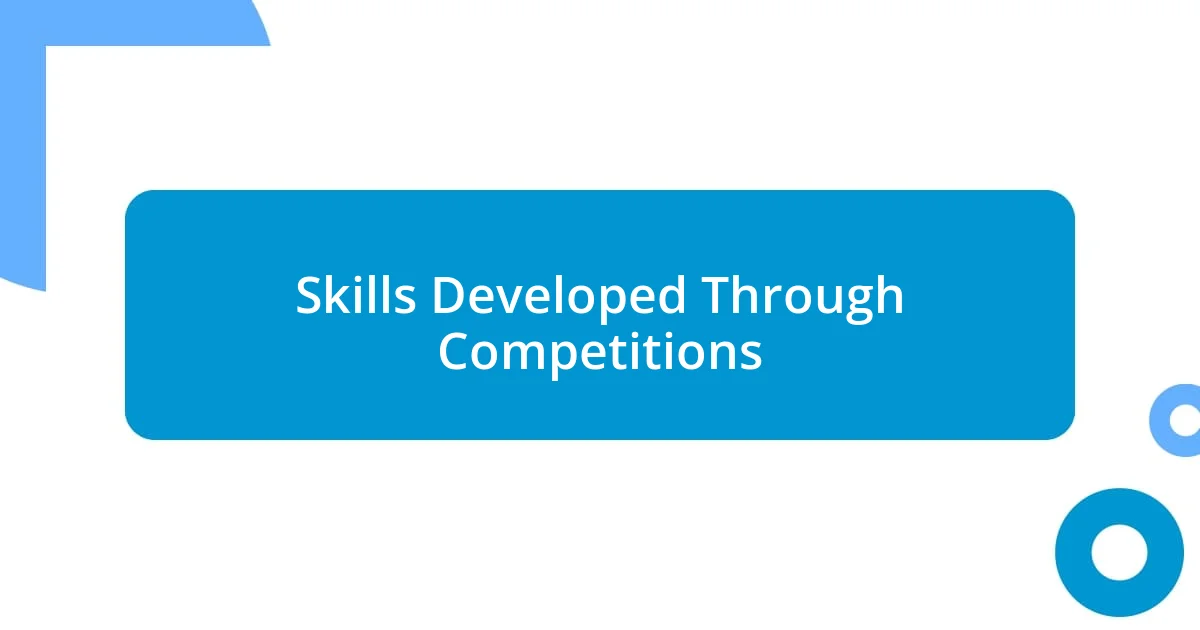
Skills Developed Through Competitions
Participating in hacking competitions has significantly sharpened my technical proficiency. Each challenge compels you to think critically and apply your knowledge in real-time. I’ll never forget the adrenaline rush when I finally broke through a complex web vulnerability—it felt like solving a mini-mystery. The sense of accomplishment that comes with these victories is not easily replicated in other environments.
Moreover, I’ve developed invaluable teamwork skills. Collaborating with teammates during high-pressure situations teaches you how to communicate effectively and delegate tasks based on each person’s strengths. I remember when we were running out of time during one competition; we had to quickly reassess our strategy. Watching us rally and think collaboratively reaffirmed my belief in the power of diverse perspectives within a team. It’s incredible how these experiences shape not just our technical capabilities but also our interpersonal skills.
Finally, competitions have ingrained a sense of adaptability in me. You never know what challenges will arise, so being flexible and ready to pivot is crucial. I learned that not every plan will work out as expected—sometimes, you just must think on your feet. This ability to adapt has proven beneficial not just in competitions but in real-world scenarios as well, reinforcing the importance of resilience in the face of challenges.
| Skill | Description |
|---|---|
| Technical Proficiency | Sharpening problem-solving and cybersecurity skills through practical challenges. |
| Teamwork | Enhancing communication and collaboration by working closely with teammates under pressure. |
| Adaptability | Learning to pivot and adjust strategies on-the-fly when faced with unexpected obstacles. |
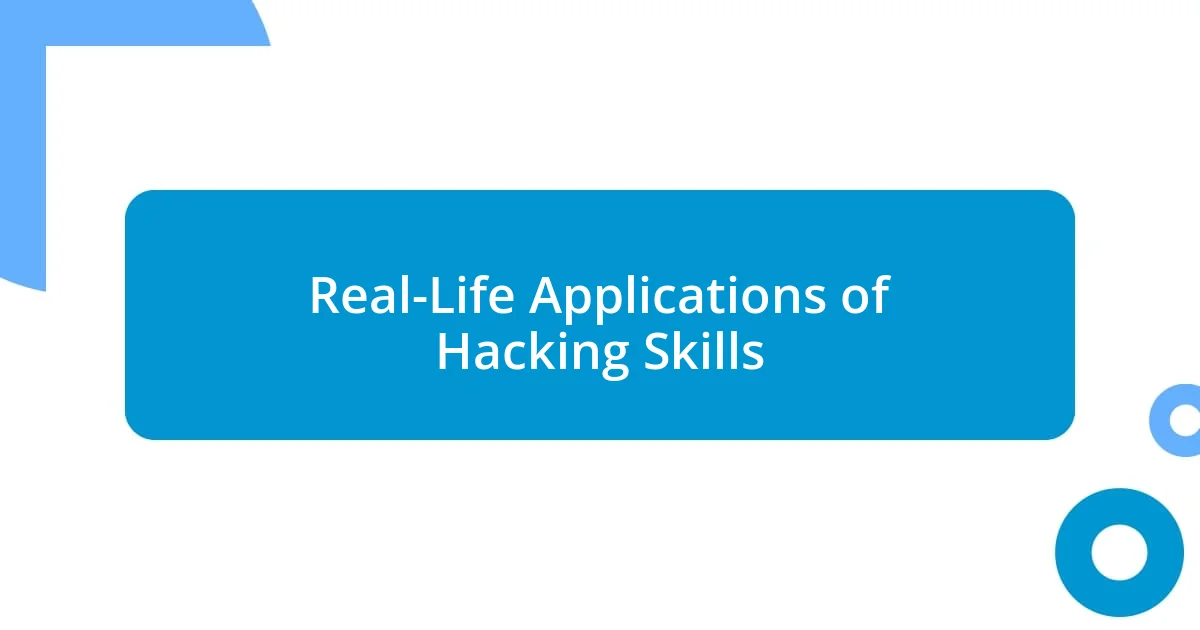
Real-Life Applications of Hacking Skills
I’ve found that the hacking skills I gained from competitions are remarkably applicable in real-life scenarios. For instance, the analytical mindset required to deconstruct security measures is invaluable when assessing vulnerabilities in everyday tech. I vividly remember a situation at work where we had to troubleshoot a significant security breach; the skills I developed in competitions enabled me to quickly pinpoint the critical areas that needed attention. It’s amazing how that intensity and focus translate directly into a professional setting.
Real-life applications of hacking skills include:
- Cybersecurity Assessments: Using penetration testing techniques to identify and mitigate vulnerabilities.
- Incident Response: Applying crisis management skills to address and resolve cyber threats efficiently.
- Secure Software Development: Informing best practices to prevent security flaws during the development process.
- Data Privacy Improvement: Enhancing strategies to protect personal and company data through risk assessment.
- Educational Workshops: Sharing knowledge gained from competitions to train others in cybersecurity awareness and best practices.
These experiences have illuminated how much competitive hacking prepares you for real-world challenges, creating a professional skill set that’s both relevant and vital in today’s tech-driven landscape.
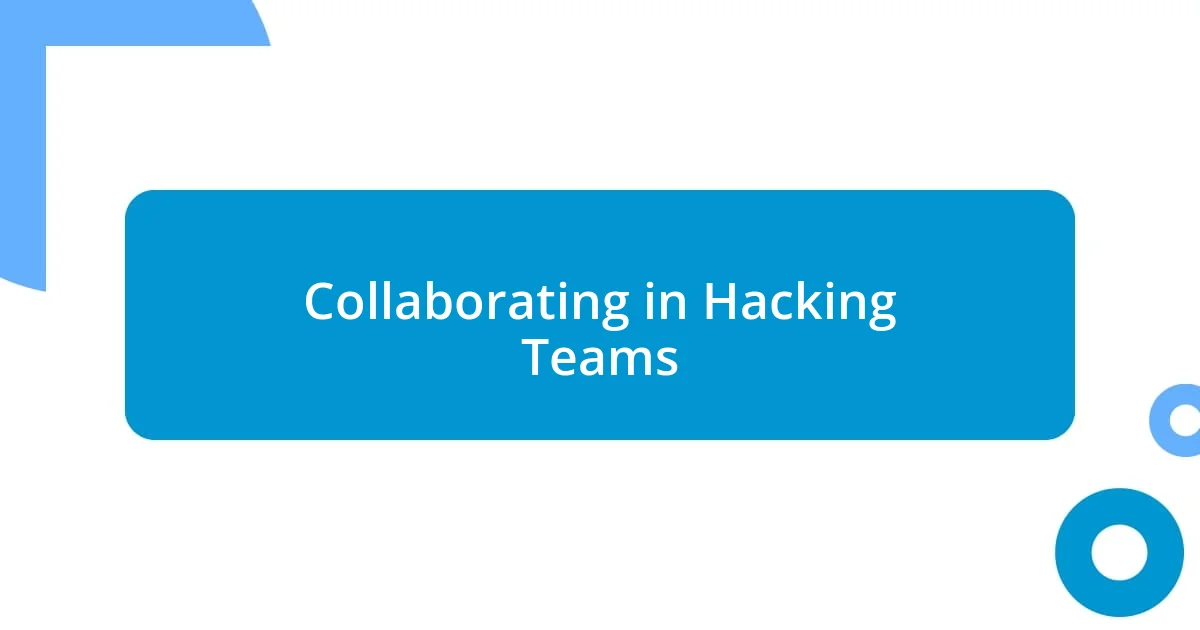
Collaborating in Hacking Teams
Collaborating in hacking teams has been one of the most rewarding aspects of my competition experience. I remember a particularly intense event where we faced a rapidly ticking clock and a seemingly insurmountable problem. It was in those moments of panic that I saw true camaraderie—each team member stepped up, their excitement palpable as we streamlined our approach. Does teamwork change the way you see challenges? Absolutely. There’s something uplifting about sharing a common goal and leveraging each other’s strengths, and I truly believe it elevates the entire problem-solving process.
Another key element I’ve learned is that effective communication is essential. I recall a scenario where one teammate uncovered a vulnerability, but we were all so focused that we almost missed her crucial input. Her animated explanation broke through our laser focus and opened up new avenues for exploration. In situations where every second counts, being able to express ideas swiftly yet clearly is vital. How can you ensure everyone is on the same page? By fostering an environment of openness, where asking questions is encouraged, and every voice matters.
Finally, I’ve noticed that embracing diverse skill sets leads to more innovative solutions. Working in teams during competitions introduces you to people with different backgrounds and specialties, which can be a game-changer. While I’m strong in penetration testing, another teammate might excel at reverse engineering. This diversity not only enhances our overall capability but also creates a dynamic where learning happens naturally. Isn’t it fascinating how collaboration can spark creativity? I’ve often walked away from competitions with not just achievements but also a deeper understanding of various approaches, making every experience richer and more enlightening.
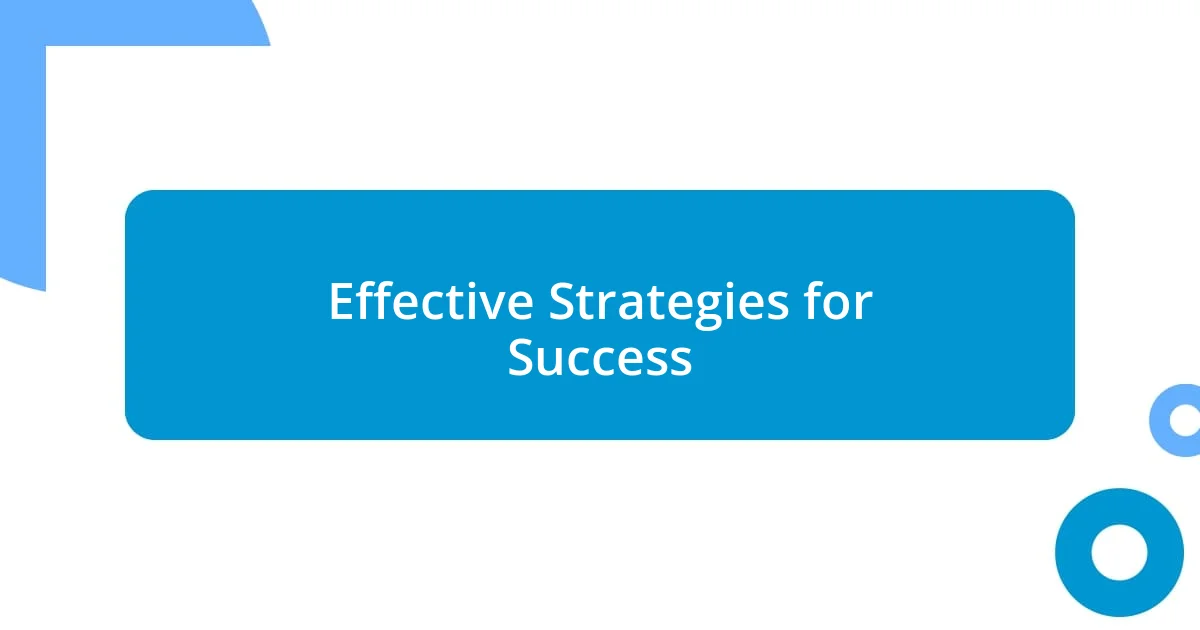
Effective Strategies for Success
To succeed in hacking competitions, I’ve found that focusing on time management is crucial. I vividly recall a competition where I got so engrossed in a single task that I lost track of the time. By the time I realized it, precious points had slipped away. Setting clear milestones for each phase of your work not only helps keep the momentum but also allows you to pivot quickly when you’re stuck. How often have you found yourself trapped in a loop of endless troubleshooting? I can assure you, breaking the problem down and moving on can often lead to those lightbulb moments later.
Additionally, honing your research skills can be a game-changer. In one particular competition, I encountered an unfamiliar tool that I needed to deploy quickly. My ability to effectively search for documentation and tutorials under pressure was my saving grace. It taught me the power of preparation—spending some time beforehand to familiarize myself with various tools can drastically enhance my toolkit during the competition. Have you ever felt like you were lost in a sea of unknowns? I have, and that sensation can be mitigated by investing a bit of time in what’s out there beforehand.
Lastly, being adaptable is a strategy that I can’t stress enough. I remember a competition where our initial approach completely fell apart early on. Instead of getting frustrated, we regrouped and brainstormed alternate strategies on the fly. That willingness to pivot not only salvaged our chances but also fostered an energizing spirit within the team. Isn’t it amazing how flexibility can turn a potential disaster into an unexpected triumph? Embracing this mindset can make all the difference in high-stakes environments.
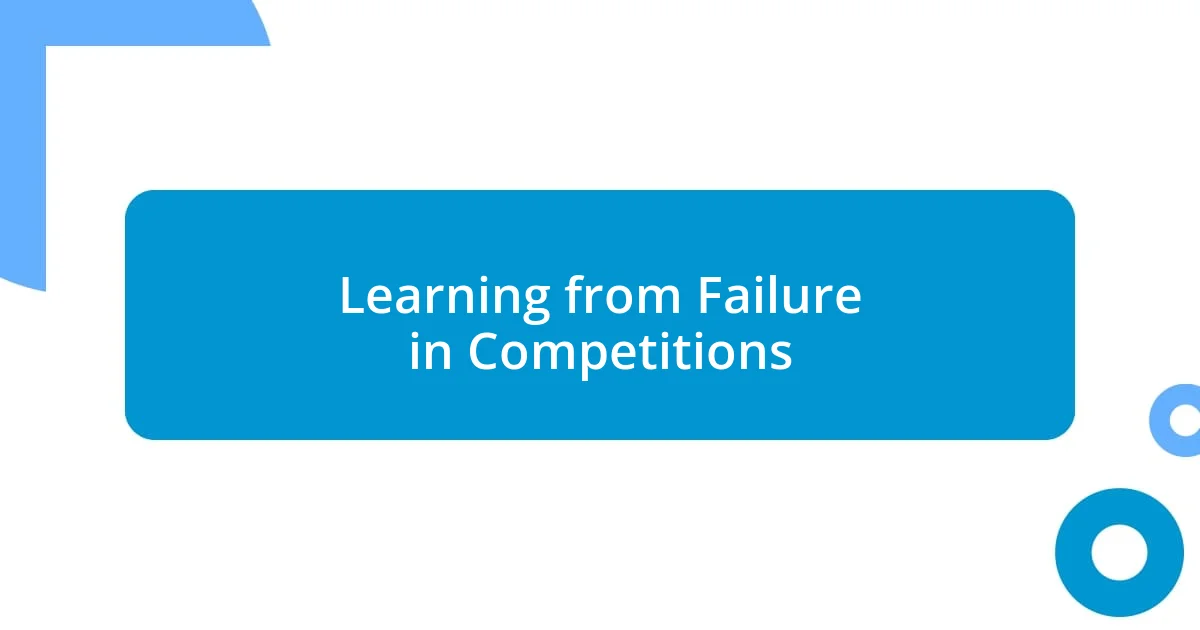
Learning from Failure in Competitions
Failure in competitions often feels discouraging at first, but it’s a powerful teacher. I remember one time when our team was confident about a vulnerability we believed we’d exploited. When it turned out to be a dead end, the air in the room shifted—the deflation was palpable. Yet, as we dissected what went wrong, I realized how that very failure laid the groundwork for our next success. Reflecting on mistakes pushes us toward growth; isn’t that a fascinating paradox?
Each defeat sharpens our focus and clarifies our strategies. I think back to a particularly challenging challenge where we fumbled through our initial plans. After regrouping, we assessed our errors openly, and guess what? It was in those discussions that we brainstormed a completely new approach, ultimately leading us to a breakthrough. This taught me that vulnerability can lead to innovation. Have you ever noticed how talking through setbacks often inspires fresh ideas? It’s moments like these that turn disappointment into advantage.
I’ve also found that the emotional impact of failure can lead to resilience. Once, I felt crushed after performing poorly in one competition—my heart was heavy with the thought of letting my team down. But the following day, that pressure sparked an insatiable drive within me to improve. I dove deep into self-study, exploring areas where I felt inadequate. That failure catalyzed a commitment to personal growth; have you ever lived through a moment that transformed your perspective? I emerged with newfound skills and a determination that I carry with me to this day.
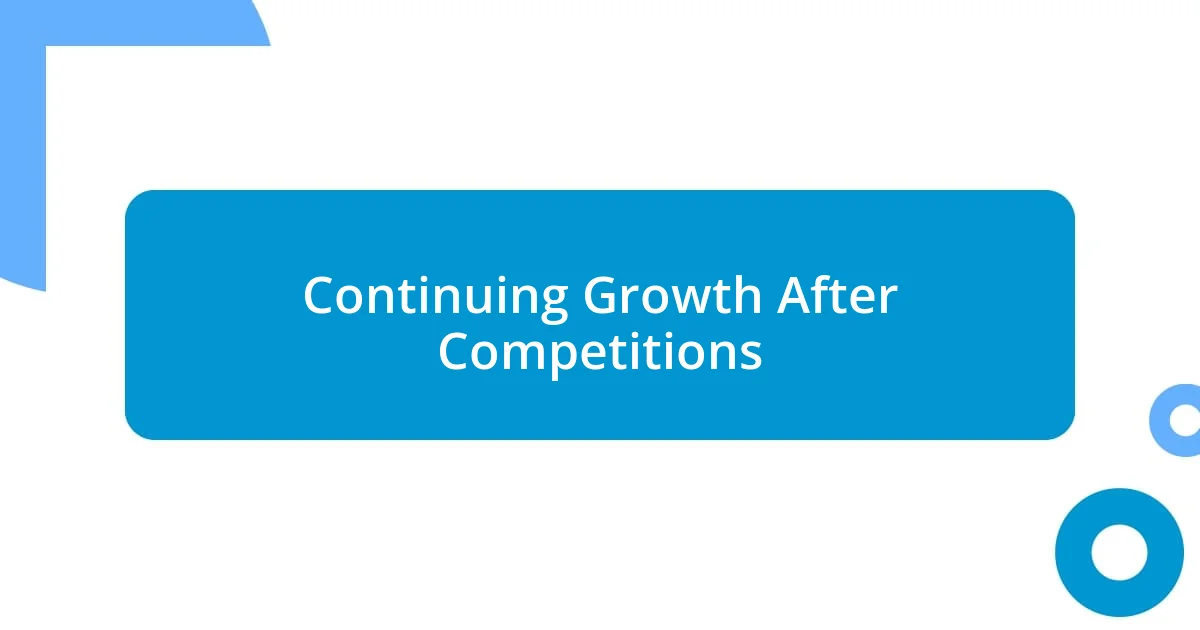
Continuing Growth After Competitions
Continuing growth after participating in hacking competitions is an enriching journey. After I wrapped up my last competition, I found myself reflecting not just on the challenges faced but also on how to build on those lessons. One thing that struck me was the importance of finding a community. Connecting with fellow competitors outside of the event has offered me a continuous flow of ideas and insights. Have you considered how valuable it can be to exchange thoughts with others who share your passion? I can assure you that this sharing of knowledge has elevated my skills in ways I never anticipated.
Moreover, I’ve learned that my growth doesn’t stop with just participating. I make a conscious effort to revisit my competition notebooks. Each time I look back at the notes, it’s like having a conversation with my past self, reminding me of both my triumphs and where I stumbled. This practice not only solidifies my understanding but also sparks new ideas I might have missed in the heat of competition. How often do we let fleeting experiences slip away? Taking the time to analyze my notes has often led to breakthroughs in my future projects.
Lastly, self-study has been a game changer. I remember after a particularly intense competition that left me feeling mentally drained, I launched into my own side projects. This allowed me to explore areas I didn’t delve into during the competition. Gradually, I noticed how these personal projects provided a fresh perspective, invigorating my passion for hacking. Have you ever experienced that refreshing spark when you lose yourself in a project? It’s incredible how nurturing your interests outside competitions can lead to continuous and meaningful growth.




